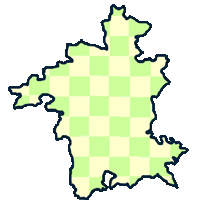Worcestershire Chess Association

Worcestershire Chess Association |
 |
Published 16 May 2009
|
Report to WCA of English Chess Federation Finance Council Meeting 26 April 2008 - Ray CollettI attended the last English Chess Federation (ECF) meeting held in London 26 April. The major decisions taken that affect members were on two fronts and there was a prolonged and poorly directed discussion on whether a compulsory individual membership fee should be imposed. 1) Game fee was raised in line with inflation to 48p 2) There was an explanation of adjustments proposed to the ECF grading scheme, to compensate for the fact that players are receiving lower grades now than they would have done 10 years ago for the same performance. There is no simple formula to convert 'old' to 'new' grades and there will be regional variations. It was agreed that there would be a transitional stage when both new and old grades are published and tournament controllers are able to specify whether new or old grades are to be used in limited grading competitions. 3) The Chief Executive Officer introduced a discussion in favour of a direct compulsory membership scheme. He and one other director argued strongly for a compulsory membership scheme, but representatives who spoke from the floor thought that their ideas were unrealistic because they had no plan that would recruit sufficient members to replace the game fee. These two directors and one other who did not speak while I was there (I had to leave before the end of the meeting to catch the train back to Worcester) resigned after the meeting. My observations: Although ECF finances are overall broadly within budget, historically the game in England has depended on philanthropic handouts from moneyed individuals to support English players at international level. This is not in the best interests of the game because it means that the strategic direction of the game is not determined by ordinary players. However, if members want to take control, some mechanism must be found to finance an enhanced national office that can command support from commercial and public sources. Broadly, the accounts presented for 2006/7 show that income was £319.4k (of which £44.5k is from direct membership scheme and Membership Organisations and £52.1k is from grading fees; £61.1k from tournament fees; and £51.5k from junior chess), expenditure £319.7k. Although not stated, most of the other income 'general funding' (£65.4k) is likely to be from the Government (Department of Culture, Media & Sport), which depends on ECF fulfilling its promises when it applied for the grant. A major expenditure is on 'management services' mostly the office at Battle, near Hastings, at £105.2k. The ECF is a company limited by guarantee and not a charity (which would allow us to avoid corporation tax and VAT). Directors of the ECF are volunteers like you and me and draw only expenses (I know that most directors do not ask for reimbursement of moneys spent on directoral duties). There are various charitable funds for chess education and junior chess that escape taxation, but they are under the control of trustees and not directly answerable to the ECF.
|